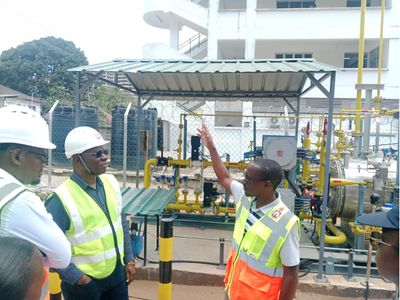The Songhor Lagoon, once envisioned as Ghana’s most promising salt-producing asset, is regaining momentum after decades of stalled development. With the potential to produce up to five million metric tonnes of salt annually, Songhor has long stood as a symbol of both promise and paralysis.
Today, through a public-private partnership with Electrochem Ghana Limited (EGL), that potential is finally being realised, albeit not without controversy.
According to historical assessments by both local and international experts, Songhor’s unique ecosystem is capable of supporting the production of up to two million metric tonnes of salt in the short term and potentially up to five million tonnes in the long term.
Yet, for decades, actual production stagnated at approximately 250,000 tonnes per year. A comprehensive development blueprint—the Songhor Master Plan—was introduced in 1991 but remained largely unimplemented for over two decades.
At the heart of the original Master Plan was a bold vision: to use the entire lagoon as a year-round reservoir, construct crystallising pans on land, and ensure equitable access through a Joint Venture Company (JVC) composed of four existing concessionaires and community representatives.
However, that vision was interrupted in 1992 when the government enacted PNDCL 287, which annulled all existing leases and vested the lagoon in the state. This move ushered in nearly four decades of stagnation, marked by political indecision and fragmented community efforts.
In 2019, the government granted a 15-year lease for the 41,000-acre Songhor Lagoon concession to Electrochem. The move sought to resolve the “complex matter” of multiple stakeholders, as highlighted in the Master Plan.
The lease was welcomed by the Ada Traditional Council and landowners, many of whom now receive ground rent from Electrochem through the Office of the Administrator of Stool Lands. However, some community members and activists have raised concerns over Electrochem’s exclusive control, calling for full adherence to the original Master Plan.
Members of the Ada Traditional Council argue that such concerns stem from misinterpretations of the law. They emphasise that many of the company’s initiatives, such as tripling the land originally allocated to communities for salt production and introducing a “Community Pan” initiative, actually go beyond the Master Plan’s provisions.
A particularly contentious issue has been the informal practice of Atsiakpo, which involves digging shallow pans directly into the lagoon bed, a practice that experts say has severely degraded the ecosystem. This method, likened to illegal mining (galamsey), has disrupted natural salt formation and damaged tributaries such as the sacred Yomo stream, which had not yielded salt in over 30 years—until recently.
Since taking over, Electrochem has spearheaded significant restoration efforts: importing clay to rebuild the lagoon bed, reinforcing embankments, and installing high-volume pumps to reintroduce seawater. These efforts have borne fruit, with areas like Yomo once again producing crystallised salt.
Despite the progress, resistance remains. In one incident, opponents sabotaged a pumping station, resulting in the critical salt beds drying up. Some individuals, allegedly driven by political motives, have circulated claims of cultural desecration and community harassment, allegations that Parliamentary investigations have dismissed.
A select Parliamentary committee, chaired by Hon. Atta Akyea, found no evidence of shrine destruction or community harassment. On the contrary, the committee noted that Electrochem’s operations have benefited the community through employment, potable water projects, interest-free loans for women, and youth development programs. In fact, thanks to Electrochem, many locals are now producing more salt than ever before.
The Ada Traditional Council has strongly endorsed Electrochem, calling the company “a reliable partner in restoring the lagoon and creating jobs.” Chiefs argue that continuous, scientifically managed production offers greater profitability and sustainability than the traditional once-a-year harvesting.
Economically, the stakes are significant. Full utilisation of Songhor’s potential could earn Ghana up to US$1 billion annually, especially if value-added salt products are developed. This would make Songhor one of Ghana’s most valuable natural resources, alongside gold and oil.
Yet, challenges remain. Some community members remain cautious of centralised control, and activists continue to call for broader community oversight and stronger government regulation.
To address these concerns and dispel misinformation, stakeholders are proposing a national civic education campaign through the National Commission for Civic Education (NCCE). The goal is to educate the public on sustainable salt production practices and the legal framework governing mineral resources.
Ultimately, all parties seem to agree on one fundamental point: Songhor is a national asset that must not fall victim to mismanagement or political division.
“The path forward lies in collaboration,” said a spokesperson for the Ada Traditional Council. “If we follow the science, the law, and the will of the people, Songhor will fulfil its destiny as a beacon of prosperity not just for Ada, but for all of Ghana.”
The post Ada Traditional Council goes firm on Songhor Salt’s US$1 billion opportunities appeared first on The Herald ghana.





